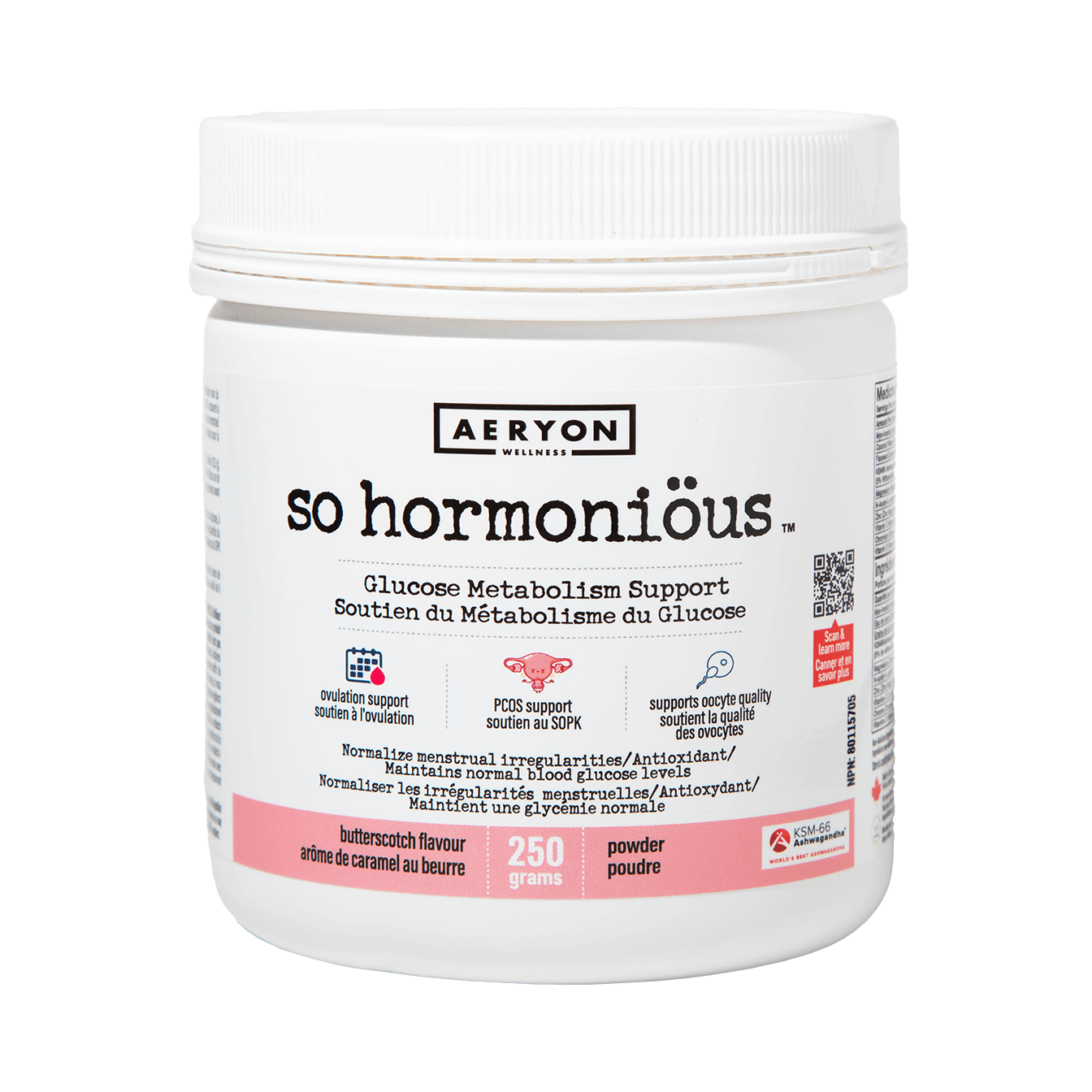Managing Blood Sugar
Consistently maintaining balanced blood sugar is crucial for optimal energy levels, mood regulation, and overall health. It also plays a pivotal role in reducing the risk of developing type 2 diabetes, which women may be particularly concerned about. Moreover, stable blood sugar supports hormonal balance, which is essential for women’s health, affecting everything from menstrual cycles to menopause symptoms.
Maintaining balanced blood sugar can be achieved through a combination of healthy eating habits and regular physical activity. A diet rich in whole foods, such as fruits, vegetables, whole grains, lean proteins, healthy fats and incorporating So Hormonious can be key to keeping blood sugar levels stable. These nutrient-dense foods provide sustained energy and help prevent spikes and crashes in blood sugar. Additionally, regular exercise can improve insulin sensitivity and help regulate blood sugar levels.
PCOS and Blood Sugar
For individuals managing Polycystic Ovary Syndrome (PCOS), supporting blood sugar is even more critical. PCOS is often accompanied by insulin resistance, which can make blood sugar management challenging. Incorporating a supplement like So Hormonious can be beneficial alongside a PCOS-friendly diet, which typically emphasizes low-glycemic-index foods, fiber-rich options, and moderate amounts of lean proteins and healthy fats. These measures can help stabilize blood sugar levels, mitigate the risk of developing type 2 diabetes, and alleviate some of the symptoms associated with PCOS, such as irregular menstrual cycles and weight gain.
Perimenopause and Blood Sugar
During perimenopause, women experience fluctuating hormone levels that can impact blood sugar control, making it increasingly important to monitor and manage glycaemic response. These hormonal changes can lead to increased insulin resistance and make blood sugar levels more difficult to predict and stabilize. Ensuring a balanced diet, rich in fibre and low-glycemic foods, and maintaining an active lifestyle are crucial to mitigating these effects. Additionally, strategic nutritional supplementation with products like So Hormonious may provide support in navigating these hormonal fluctuations and promote better blood sugar balance throughout the perimenopause transition.
Nutrition

Nutrition is a key factor in the management of Polycystic Ovary Syndrome (PCOS) and can play a significantly influential role on the occurrence and severity of symptoms. In general it is recommended to focus on a low GI diet consisting of plenty of fruits and vegetables, healthy fats, lean protein, and complex carbohydrates.
Below we cover more in detail some specific foods that may be particularly beneficial for PCOS.
Fermented foods:
PCOS women have been shown to lack diversity in the gut and experience dysbiosis; a lack of beneficial microbes. An imbalanced microbiome has been shown to lead to dysregulation of glucose metabolism, altered production of gut hormones regulating energy balance, and local and systemic inflammation. Fermented foods are a rich source of beneficial bacteria, known as probiotics, which can help improve gut health by increasing the diversity and number of beneficial bacteria in the gut. Fermented foods can include foods such as yogurt, kefir, sauerkraut, kimchi, kombucha, and miso.
Prebiotics:
Prebiotics are a type of dietary fiber that cannot be digested by the human body, but are used as a food source by the beneficial bacteria in the gut. By feeding the beneficial bacteria, prebiotics can help improve gut health and potentially benefit conditions such as PCOS by reducing inflammation and improving insulin sensitivity.
Prebiotics can be found in a variety of plant-based foods such as asparagus, artichokes, onions, garlic, leeks, bananas, oats, and barley.
Omega 3 fats:
Omega-3 fatty acids are a type of healthy fat that has been linked to numerous health benefits among women with polycystic ovary syndrome. Omega 3 fats have been shown to improve fatty liver and cardiovascular health, lower inflammation, balance lipid levels, reduce androgen levels, and improve menstrual regularity and fertility.
Omega-3 fatty acids can be found in fatty fish such as salmon, sardines, and mackerel, as well as in plant-based sources such as chia seeds, flaxseeds, and walnuts.
Cinnamon:
Ceylon cinnamon is an antioxidant and anti-inflammatory spice that contains many compounds that can improve the PCOS condition. Some studies have suggested that cinnamon may help improve insulin sensitivity and lower blood sugar levels in people with diabetes and prediabetes. It has also been associated with increased ovulation and menstruation rates (7). This could potentially benefit women with PCOS who struggle with insulin resistance as well as menstrual regularity and fertility.
Avocado:
Women with PCOS have been shown to have an increased risk of cardiovascular disease and metabolic dysfunction due to underlying inflammation and insulin resistance. The good news is avocados can help!
Avocados are rich in fiber, which help to support good gut health and regularity, promote satiety, support weightloss, and slow the absorption of glucose into the bloodstream while preventing insulin spikes. They also provide monounsaturated fatty acids that can protect heart health, reduce inflammation, and balance blood cholesterol levels.
Flaxseeds:
Flaxseeds are a rich source of dietary fiber, lignans, and alpha-linolenic acid (ALA), which is an omega-3 fatty acid. These nutrients may provide potential health benefits for women with polycystic ovary syndrome.
Flaxseed is one of the richest dietary sources of lignans, a type of antioxidant and phytoestrogen that can help to modulate estrogen levels and lower inflammation, which are commonly elevated among women with PCOS. It’s recommended to consume ground flaxseeds rather than whole flaxseeds, as ground flaxseeds are more easily digested and absorbed by the body.
Organic soy:
Isoflavones found in soy have been associated with increased fertility rates and may improve overall hormonal balance and insulin resistance in PCOS women. However, the type of soy you choose to consume does matter. Always choose whole, unprocessed, and organic soy products to reap the benefits.
Beans & legumes:
Beans and legumes are a good source of plant-based protein and fiber, thus they can be a beneficial addition to the diet for women with PCOS.
They are also rich in phytonutrients such as isoflavones, which have been shown to help reduce oxidative stress and improve insulin sensitivity. Beans and legumes are particularly high in fiber, they can help to stabilize the blood sugar response and also feed beneficial microbes in the gut. Some examples of legumes and beans include lentils, chickpeas, black beans, kidney beans, and navy beans.
Leafy greens:
Leafy greens such as spinach, kale, collard greens, and swiss chard are an excellent source of vitamins, minerals, and fiber.
Leafy greens are a good source of magnesium, which can help improve insulin sensitivity and reduce insulin resistance. They are also low in calories and high in fiber, which can promote satiety and reduce food intake as well as support weight management. As a good source of antioxidants, leafy greens can also provide anti-inflammatory properties.
Berries:
Berries in general, are one of the best types of fruits for PCOS due to their nutrient density and low glycemic index. They are a rich source of vitamins, minerals, fiber and antioxidants that may help improve several aspects of health in women with PCOS including lowering oxidative stress and inflammation, stabilizing blood glucose levels post meals, and reducing high insulin levels.
Exercise
Exercise is an essential piece to managing symptoms of PCOS, as it can help to regulate insulin levels, reduce inflammation, and promote weight loss. Here are some exercises that may be beneficial for women with PCOS:
- Cardiovascular exercise: Activities such as brisk walking, running, cycling, and swimming can help to improve cardiovascular health and increase insulin sensitivity. Aim for at least 30 minutes of moderate-intensity exercise on most days of the week.
- Strength training: Building muscle can help to increase metabolism, burn more calories, and improve insulin sensitivity. A study found that 16 weeks of strength training significantly reduced testosterone levels and improved quality of life among PCOS women. Focus on compound exercises that work multiple muscle groups, such as squats, lunges, push-ups, and pull-ups.
- High-intensity interval training (HIIT): HIIT involves alternating periods of high-intensity exercise with periods of rest. It can be a time-efficient way to improve cardiovascular fitness and insulin sensitivity. Research has shown that HIIT alone is effective for reducing HOMA-IR and BMI in women with PCOS. Examples of HIIT workouts include sprinting, jump squats, and burpees.
- Yoga: Yoga can help to reduce stress and improve overall health and wellbeing. It may also be beneficial for managing PCOS symptoms such as insulin resistance, inflammation, and menstrual irregularities. A regular mindful yoga practice has been found to improve serum androgen levels, a hallmark feature of PCOS, as well as anxiety and depression among women with PCOS.
- Pilates: Pilates can be a low-impact way to build strength, improve flexibility, and promote relaxation while reducing stress.
Mindset
Mindset can play a significant role in navigating the PCOS condition. Women with PCOS may experience physical symptoms such as weight gain, acne, and excessive hair growth, which can affect their self-esteem and body image. In addition, PCOS is associated with an increased risk of anxiety and depression.
Here are some tips for developing an empowering mindset to help you manage PCOS:
- Focus on what you can control: PCOS is a hormonal disorder that can be challenging to manage, but there are lifestyle changes you can make that will improve your symptoms and quality of life. Focus on the things that you can control, such as eating a healthy diet, exercising regularly, and getting enough sleep.
- Practice self-compassion: Be kind to yourself and treat yourself with the same care and compassion that you would give to a friend. Remember that PCOS is not your fault, and you are not alone in dealing with this condition.
- Set realistic goals: Setting achievable goals can help you to stay motivated and make progress in managing your symptoms. For example, you might set a goal to exercise for 30 minutes three times per week or to eat a serving of vegetables with every meal. This will make it more likely for you to stay committed and dedicated to the process.
- Seek support: PCOS can be a challenging condition to manage on your own. Seek support from friends, family members, or a healthcare provider who understands PCOS and can offer guidance and advice. Remember that developing an empowering mindset takes time and practice. Be patient with yourself, and focus on making small changes that can lead to significant improvements in your health and wellbeing over time.
Sleep
Sleep plays a crucial role in overall health and wellbeing, and it’s particularly important for women with PCOS. Studies have shown that women with PCOS often experience sleep disturbances, including difficulty falling asleep, staying asleep, and experiencing restful sleep.
Here are some tips for improving your sleep with PCOS:
- Stick to a sleep schedule: Try to go to bed and wake up at the same time each day, even on weekends. This helps to regulate your body’s natural sleep-wake cycle, also known as the circadian rhythm, and can improve the quality of your sleep.
- Create a relaxing bedtime routine: Engage in calming activities before bed, such as taking a warm bath, reading a book, or practicing relaxation techniques like deep breathing or meditation. This can help you to unwind and fall asleep more easily.
- Make your bedroom conducive to sleep: Create a sleep-friendly environment by keeping your bedroom cool, dark, and quiet. Remove distractions such as electronics, and invest in comfortable bedding and pillows.
- Limit caffeine and alcohol intake: Caffeine and alcohol can disrupt sleep and make it more difficult to fall asleep or stay asleep. Try to limit your intake of these substances, particularly in the hours leading up to bedtime.
- Exercise regularly: Regular exercise can improve sleep quality, particularly when done earlier in the day. Try to get at least 30 minutes of moderate-intensity exercise most days of the week.
Stress Management
Stress can exacerbate symptoms of PCOS and interfere with hormonal balance, so it’s important to prioritize stress management in your daily life. Chronic stress can lead to imbalances in cortisol and other hormones, which can worsen symptoms like acne, hair loss, and menstrual irregularities.
Here are some tips for managing stress with PCOS:
- Practice relaxation techniques: Practices such as deep breathing, meditation, yoga, and massage can help to calm the mind and reduce feelings of stress and anxiety.
- Get regular exercise: Regular exercise can help to reduce stress levels and promote feelings of relaxation. Aim for at least 30 minutes of exercise most days of the week and include low intensity movement such as yoga, walking or pilates.
- Get enough sleep: Sleep is essential for stress management, and chronic sleep deprivation can lead to increased stress levels. Aim for at least seven hours of sleep per night.
- Prioritize self-care: Engage in activities that you enjoy, such as reading, spending time with friends, or taking a relaxing bath. Self-care is important for reducing stress and promoting overall wellbeing.
- Eat a healthy diet: Eating a balanced diet rich in whole foods can help to reduce inflammation and promote hormonal balance, which can in turn reduce stress levels.
- Find community: Connecting with a supportive community is an important part of managing PCOS as well as reducing stress through human connection. A community can offer emotional support, share helpful tips and strategies, and provide a sense of belonging.
What is Included in So Hormoniöus?
Myo-Inositol:
Inositol improves the way the body uses insulin and promotes normal hormone levels, which in turn promote regular menstrual cycles and normal ovarian function.
N- Acetyl Cysteine:
May help improve insulin levels, insulin sensitivity, ovulation, and fertility. Studies show it helps reduce menstrual irregularity, abnormal hair growth, and cholesterol.
Magnesium Citrate:
Shown to improve insulin sensitivity, fight fatigue & stress, improve heart health, fight symptoms of depression and promotes better sleep.
KSM66 Ashwagandha:
The highest grade Ashwaganda using the root only. Treats symptoms of irregular periods, infertility, depression and weight gain by restoring hormonal balance.
Vitamin D3:
Lowers inflammation, reduces androgen levels and improves mood.
Chromium Picolinate:
A trace mineral that enhances the function of insulin and improves insulin resistance.
Zinc Gluconate:
May help improve PMS symptoms, fertility, hair loss, acne prone skin and reduce inflammation.
Coconut Water Powder:
Coconut Water Powder provides an abundance of 5 electrolytes that are known to support rapid hydration: sodium, magnesium, calcium, potassium, and phosphorus.
Flax Seed Powder:
Flax seeds benefit females by maintaining the normal length between the ovulation and menstruation. It also helps females in fertility by increasing the chances of conception. It also helps to maintain the hormonal balance. Flax seeds have also shown some benefits for improvement of PCOS.
Sources
- Effects of Omega-3 Fatty Acid in Nonalcoholic Fatty Liver Disease: A Meta-Analysis
- Omega-3 fatty acid supplements improve the cardiovascular risk profile of subjects with metabolic syndrome, including markers of inflammation and auto-immunity
- Omega-3 supplementation effects on polycystic ovary syndrome symptoms and metabolic syndrome
- The effect of omega-3 supplementation on androgen profile and menstrual status in women with polycystic ovary syndrome: A randomized clinical trial
- N-3 polyunsaturated fatty acids: relationship to inflammation in healthy adults and adults exhibiting features of metabolic syndrome
- Effectiveness of Omega-3 fatty acid for polycystic ovary syndrome: a systematic review and meta-analysis
- Cinnamon may be effective treatment for PCOS
- Evaluation of the Clinical and Epidemiologic Literature
- The Effects of Soy Isoflavones on Metabolic Status of Patients With Polycystic Ovary Syndrome
- Quality of Life in Women with Polycystic Ovary Syndrome after a Program of Resistance Exercise Training
- Regular Mindful Yoga Practice as a Method to Improve Androgen Levels in Women With Polycystic Ovary Syndrome: A Randomized, Controlled Trial
- Sleep disturbances in women with polycystic ovary syndrome: prevalence, pathophysiology, impact and management strategies
Made for women by women
With highly studied and proven ingredients to support women's wellness.

Made For You
Aeryon Wellness supplements are formulated specially for your wellness needs!

100% Moneyback Guarantee
Our customers love their Aeryon Wellness products, and they let us know by leaving amazing reviews!

No Fillers
Aeryon Wellness products are made without fillers or gimmicks, just nutrition to boost your health.
SUBSCRIBE TO OUR NEWSLETTER
Join the movement today!
Sign up to our 5 Pillars Newsletter to receive inspirational monthly emails
featuring topics from each of our 5 pillars.








